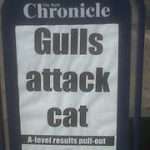It must be a slow news day. Garth Brooks is finally and irrevocably cancelled; the parliamentary recess is beginning; big sports stories are still weeks away; so we have a story of seagulls. The country’s leading newspaper reports a politician’s complaint, “Dublin seagulls have lost the run of themselves completely and must be stopped.” A member of the senate claims that, among other things, children’s lollipops are being stolen by swooping seagulls in scenes worthy of Alfred Hitchcock.
Four years ago, a similar story was reported in the English city of Bath. “Gulls attack cat”, the headline on a newspaper board caught the eye. Walking through the city on a beautiful English bank holiday Monday, we were so convinced that the headline was a misprint that we searched around for another news board before being convinced that the top news story was about seagulls attacking a cat.
We thought that Bath must be a wonderful place to live. Bath and North East Somerset unitary authority has a population of 180,000 – considerably larger than Cork or Limerick – and the lead story of the local newspaper was an incident that would surely barely merit mention of any sort in most places.
Unfortunately, it being a bank holiday, both the shops we saw with the Bath Chronicle board were closed; it was not possible to buy a paper to discover what other issues were concerning the citizens of what must be one of the most picturesque cities in the world.
Perhaps the headline was in the tradition of the alleged 1912 headline, attributed in various forms to various newspapers, but never actually printed anywhere, “Titanic sinks: Local man feared dead”, in its emphasis on the local and the particular, or perhaps it is a reflection of a community at peace with itself.
To live in a community where discord in the animal kingdom was worthy of report seemed like living in some Elysian vision, far removed from drug dealers, graffiti, and teenaged boys drunk on cheap lager; far removed from corruption and ghost estates, far removed from those who had made millions walking away from the problems they had caused.
Perhaps the sheer price of housing in the city of Bath made the community self-selecting, though the price of housing did not inhibit graffiti and crime in south Dublin, or perhaps Bath had a secret they should have been sharing share with others.
Perhaps the senator’s attack on gulls in Dublin is a sign that all the other problems have gone away – or perhaps it is just the silly season.
